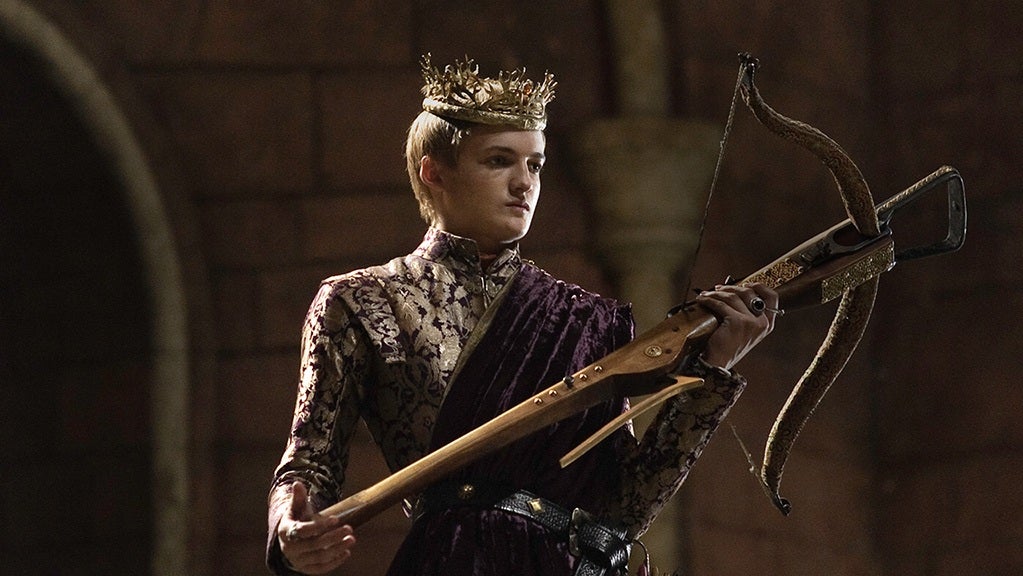Game of Thrones' 'Purple Wedding': George R.R. Martin explains thinking behind Joffrey's demise
Author took inspiration from King Stephen's son Eustace

Your support helps us to tell the story
From reproductive rights to climate change to Big Tech, The Independent is on the ground when the story is developing. Whether it's investigating the financials of Elon Musk's pro-Trump PAC or producing our latest documentary, 'The A Word', which shines a light on the American women fighting for reproductive rights, we know how important it is to parse out the facts from the messaging.
At such a critical moment in US history, we need reporters on the ground. Your donation allows us to keep sending journalists to speak to both sides of the story.
The Independent is trusted by Americans across the entire political spectrum. And unlike many other quality news outlets, we choose not to lock Americans out of our reporting and analysis with paywalls. We believe quality journalism should be available to everyone, paid for by those who can afford it.
Your support makes all the difference.Contrary to the fist-pumping and cries of "Let him choke! Die!" that King Joffrey's poisoning was met with from viewers in Game of Thrones season 4 episode 2 "The Lion and the Rose", Baratheon will surely be a character we'll come to miss.
*Spoilers everywhere*
As is so often the case, the villain can be the most compelling character, whom viewers keep coming back for though they may wish them dead.
Entertainment Weekly put this to the fantasy series' author in a recent interview, asking him: "In some ways, Joffrey’s death is the toughest death for viewers because he’s such an entertaining character to lose. You really had such fun with that character and Jack Gleeson’s performance is so malevolent. Can you talk about the decision you made to end this character when you did and how you did?"
He offered an elucidating reply on the importance of Joffrey's death, saying:
"Oh boy, it was so long ago! Lets see, the book came out in 2000, so I guess I wrote those scenes in like 1998. I knew all along when and how Joffrey was going to die, and on what occasion. I’d been building up to it for three years through the first books. Part of it was that there’s a lot of darkness in the books. I’ve been pretty outspoken in my desire to write a story where decisions have consequences and no one is safe.

"But I didn’t want it to be unrelentingly bleak—I don’t think everyone would read the books if everything was just darkness and despair and people being horribly tortured and mutilated and dying. Every once in a while you have to give the good guys a victory — where the guys who are perhaps a lighter shade of grey have a victory over the guys who are a darker shade of grey. The Red Wedding and this — fans call this the Purple Wedding — occur in the same book. In the TV show, it’s separate seasons. But Joffrey’s death was in some ways a counterweight for readers to the death of Robb and Catelyn. It shows that yes, nobody is safe—sometimes the good guys win, sometimes the bad guys win. Nobody is safe and that we are playing for keeps.
"I also tried to provide a certain moment of pathos with the death. I mean, Joffrey, as monstrous as he is — and certainly he’s just as monstrous in the books as he is in the TV show, and Jack has brought some incredible acting chops to the role that somehow makes him even more loathsome than he is on the page — but Joffrey in the books is still a 13-year-old kid. And there’s kind of a moment there where he knows that he’s dying and he can’t get a breath and he’s kind of looking at Tyrion and at his mother and at the other people in the hall with just terror and appeal in his eyes—you know, “Help me mommy, I’m dying."
"And in that moment, I think even Tyrion sees a 13-year-old boy dying before him. So I didn’t want it to be entirely, “Hey-ho, the witch is dead.” I wanted the impact of the death to still strike home on to perhaps more complex feelings on the part of the audience, not necessarily just cheering."
Martin also explained how the inspiration for the twist came from the death of a medieval king.
"I don’t know how it comes across in the show, because I haven’t actually seen it yet, but the poison that is used to kill Joffrey is one that I introduce earlier in the books and its symptoms are similar to choking. So a feast is the perfect time to use this thing. I think the intent of the murderer is not to have this become another Red Wedding—the Red Wedding was very clearly murder and butchery. I think the idea with Joffrey’s death was to make it look like an accident — someone’s out celebrating, they haven’t invented the Heimlich maneuver, so when someone gets food caught in his throat, it’s very serious.
"I based it a little on the death of Eustace, the son of King Stephen of England. Stephen had usurped the crown from his cousin, the empress Maude, and they fought a long civil war and the anarchy and the war would be passed down to second generation, because Maude had a son and Henry and Stephen had a son. But Eustace choked to death at a feast. People are still debating a thousand of years later: Did he choke to death or was he poisoned? Because by removing Eustace, it brought about a peace that ended the English civil war. Eustace’s death was accepted [as accidental], and I think that’s what the murderers here were hoping for — the whole realm will see Joffrey choke to death on a piece of pie or something. But what they didn’t count on, was Cersei’s immediate assumption that this was murder. Cersei wasn’t fooled by this for a second. She doesn’t believe that it was an accidental death. You saw the scene filmed, does it come across as he could possibly be just choking or is it very clear he’s been poisoned?"
Jack Gleeson, who played Joffrey, has since announced that he will retire from acting at the age of 21 now that Game of Thrones is over.
Join our commenting forum
Join thought-provoking conversations, follow other Independent readers and see their replies
Comments